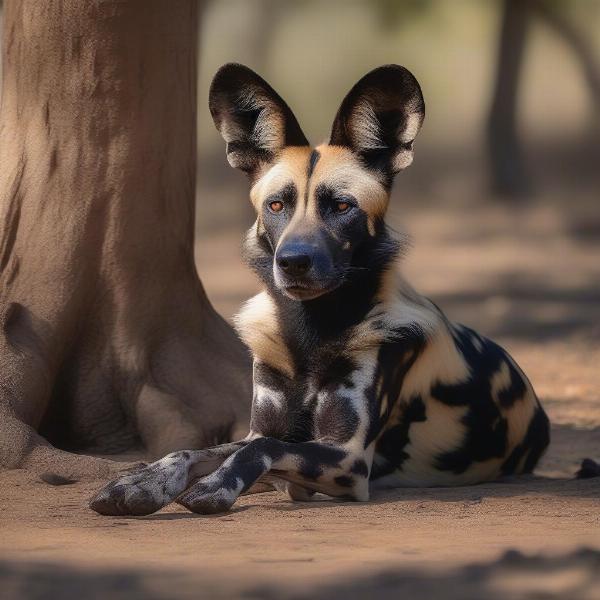The search term “African wild dog for sale” raises complex issues surrounding the ownership and conservation of these endangered animals. While the prospect of owning such a unique creature might be appealing, it’s crucial to understand the ethical implications and legal restrictions involved. This article delves into the realities of African wild dog ownership, exploring why private ownership is generally unsuitable and highlighting the importance of supporting conservation efforts instead.
Why You Won’t Find African Wild Dogs for Sale
The simple answer is: private ownership of African wild dogs is almost universally prohibited. These animals are classified as endangered, and their complex social structures, specialized dietary needs, and demanding environmental requirements make them unsuitable for domestic environments. Attempting to purchase one could lead to legal repercussions and contribute to the illegal wildlife trade, further endangering the species.
The Complexities of African Wild Dog Care
African wild dogs, also known as painted dogs, are highly social animals that live in packs with intricate hierarchies. Their natural habitat spans vast territories in sub-Saharan Africa, where they engage in cooperative hunting and complex communication. Replicating these conditions in captivity is virtually impossible, leading to significant welfare concerns for captive individuals.
Dietary Needs and Environmental Enrichment
Their diet consists primarily of wild prey, and providing a nutritionally balanced and stimulating diet in captivity is a significant challenge. Furthermore, African wild dogs require extensive space to roam and explore, mimicking their natural foraging behaviors. A typical backyard or domestic enclosure falls far short of meeting these needs.
Social Deprivation and Behavioral Issues
Isolating an African wild dog from its pack can lead to severe psychological distress and behavioral problems. These animals thrive on social interaction and the complex dynamics within their pack structure. Depriving them of this essential element can result in anxiety, depression, and self-destructive behaviors.
Supporting Conservation: The Ethical Alternative
Instead of seeking to own an African wild dog, consider supporting conservation organizations dedicated to protecting these incredible animals in their natural habitat. Numerous organizations are working tirelessly to combat poaching, habitat loss, and human-wildlife conflict, all of which pose significant threats to the survival of African wild dogs.
How You Can Make a Difference
Donations to reputable conservation organizations provide crucial funding for research, anti-poaching patrols, community outreach programs, and habitat restoration projects. These efforts are essential for securing the future of African wild dogs and ensuring their survival for generations to come.
The Importance of Education and Awareness
Spreading awareness about the plight of African wild dogs and the threats they face is also vital. Educating others about the importance of conservation and dispelling myths surrounding exotic pet ownership can help reduce demand for wild animals in the illegal pet trade.
Responsible Wildlife Tourism
Another way to experience the magnificence of African wild dogs is through responsible wildlife tourism. Choosing eco-friendly tour operators that prioritize animal welfare and contribute to conservation initiatives allows you to observe these animals in their natural environment without causing harm.
 African wild dog in its natural habitat
African wild dog in its natural habitat
Conclusion
While the idea of owning an African wild dog might seem enticing, the realities of their complex needs and the ethical considerations surrounding their captivity make it an unsuitable and often illegal pursuit. Instead, focus your efforts on supporting conservation initiatives that protect these magnificent creatures in the wild, ensuring their survival for future generations. By choosing to support conservation, you can make a tangible difference in the lives of African wild dogs and contribute to a more sustainable future for wildlife.
FAQ
- Can you buy an African wild dog? No, private ownership of African wild dogs is generally illegal and highly discouraged due to their complex needs and conservation status.
- How can I help protect African wild dogs? Support reputable conservation organizations through donations or volunteering, and spread awareness about the importance of protecting these endangered animals.
- Where can I see African wild dogs in the wild? Responsible wildlife tourism offers opportunities to observe African wild dogs in their natural habitat. Choose eco-friendly tour operators that prioritize animal welfare and contribute to conservation.
- What are the biggest threats to African wild dogs? Habitat loss, poaching, and human-wildlife conflict are among the most significant threats facing African wild dogs.
- What is the social structure of African wild dogs like? They live in complex packs with established hierarchies, engaging in cooperative hunting and intricate communication.
- What do African wild dogs eat? Their diet consists primarily of wild prey, making it challenging to replicate their nutritional needs in captivity.
- Why are African wild dogs endangered? Habitat loss, poaching, disease, and competition with other predators have contributed to their decline in numbers.
ILM Dog is a leading international dog care website dedicated to providing expert advice and resources for dog owners and enthusiasts worldwide. We cover a wide range of topics, from breed selection and health care to training, nutrition, and grooming. Our mission is to empower dog owners with the knowledge and tools they need to provide the best possible care for their canine companions. For further assistance and expert advice, please contact us via email at [email protected] or by phone at +44 20-3965-8624. ILM Dog is your trusted source for all things dog-related.